Unit 8 Have you read Treasure Island yet 重要知识点复习课件
文档属性
| 名称 | Unit 8 Have you read Treasure Island yet 重要知识点复习课件 |  | |
| 格式 | pptx | ||
| 文件大小 | 1.1MB | ||
| 资源类型 | 试卷 | ||
| 版本资源 | 人教新目标(Go for it)版 | ||
| 科目 | 英语 | ||
| 更新时间 | 2022-07-07 10:26:40 | ||
图片预览

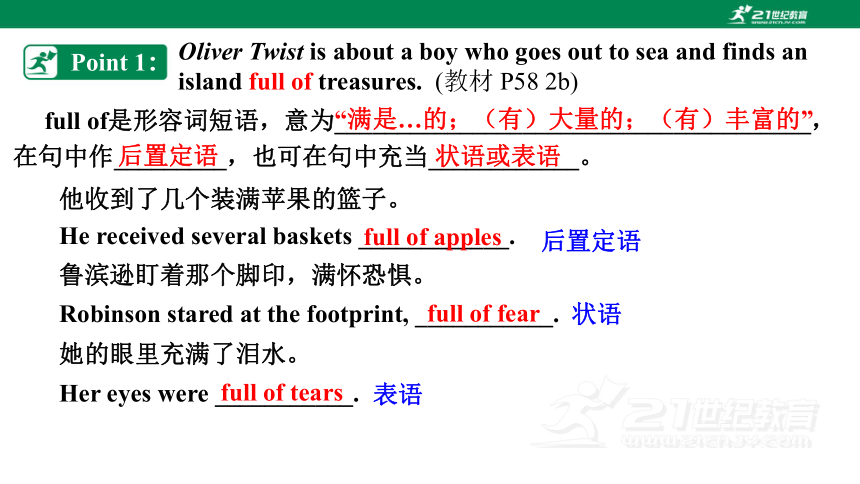
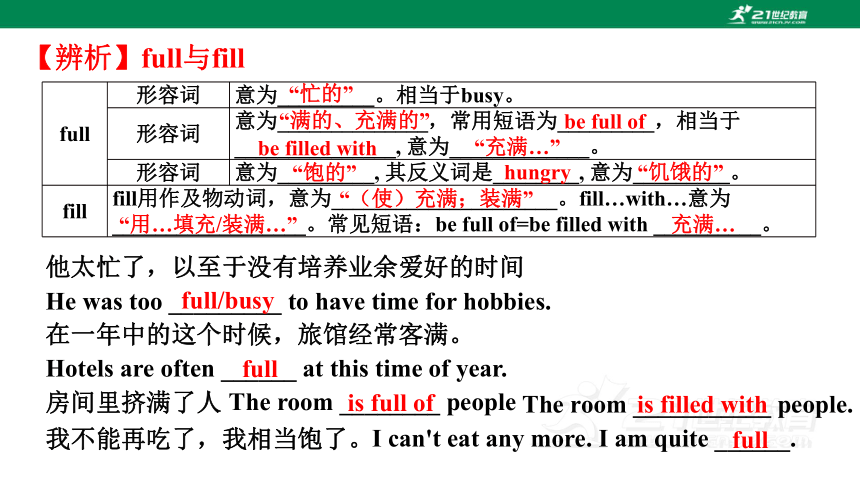
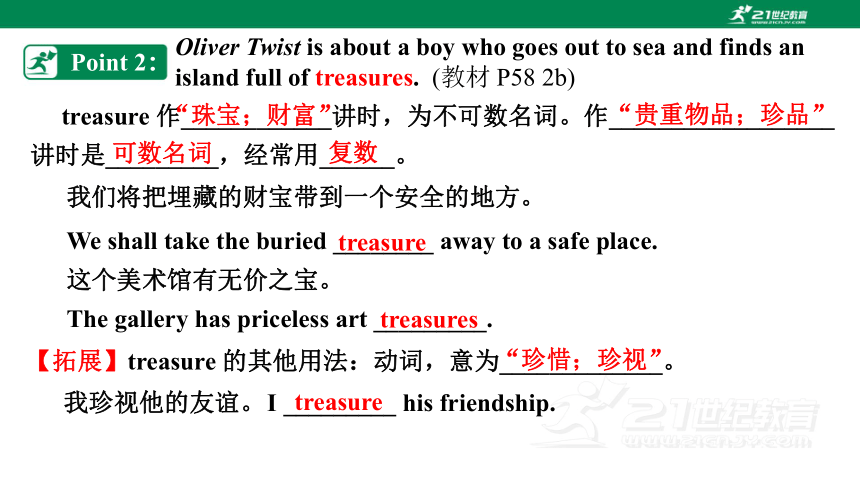
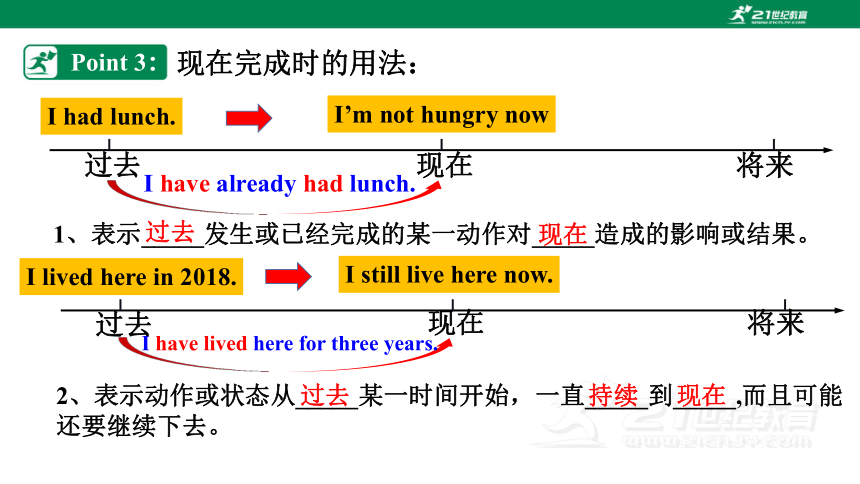
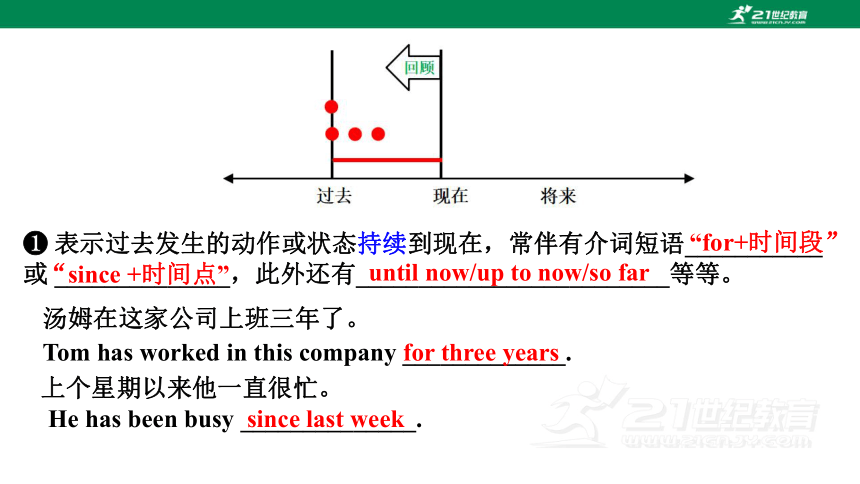
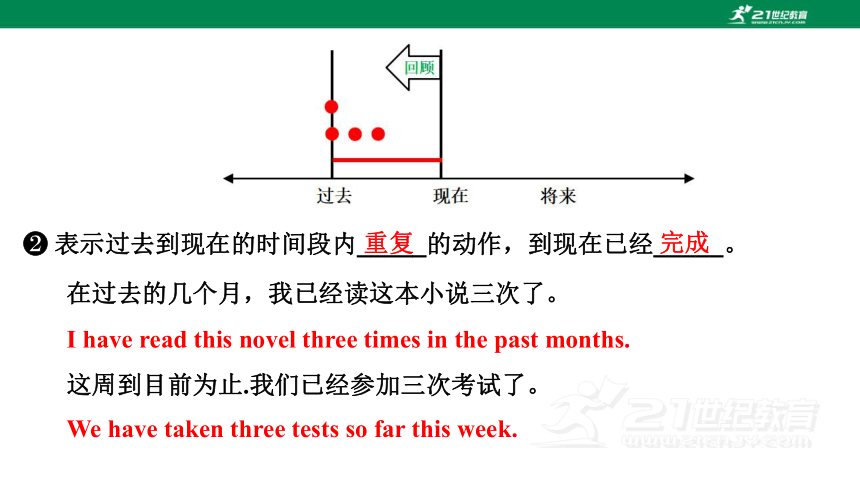
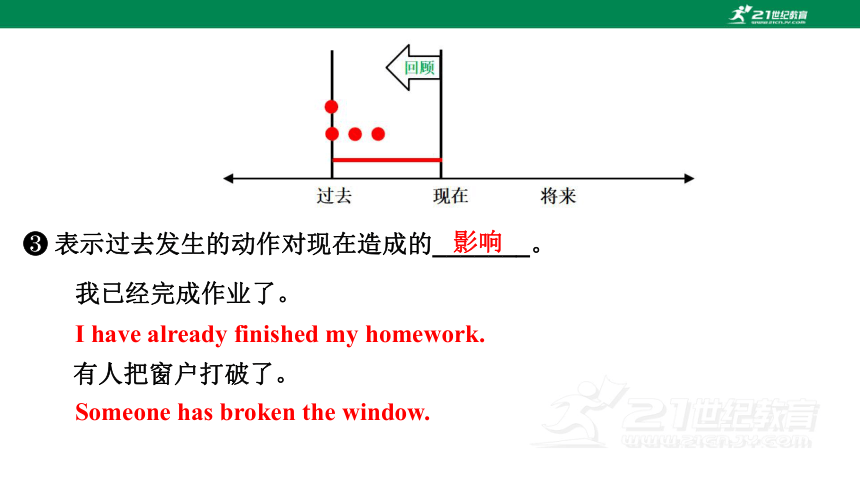
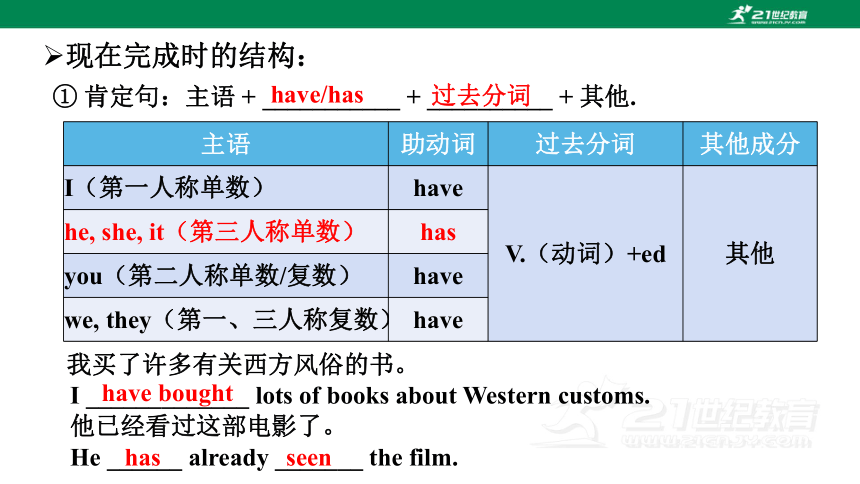
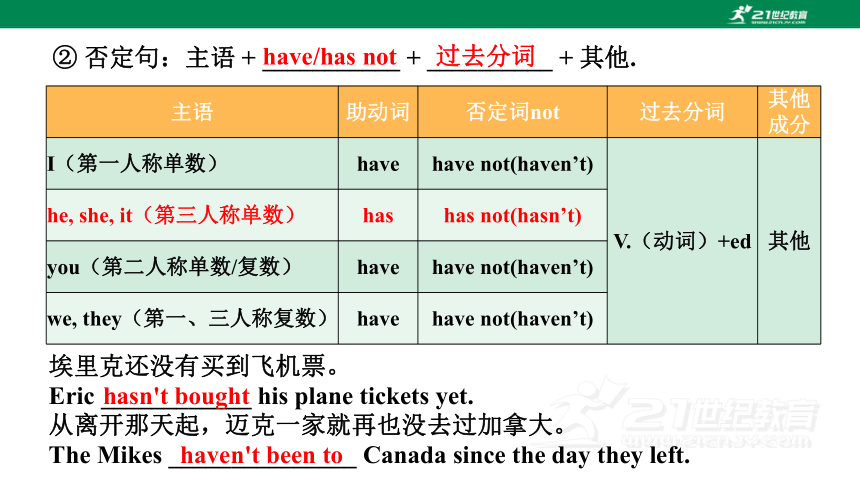
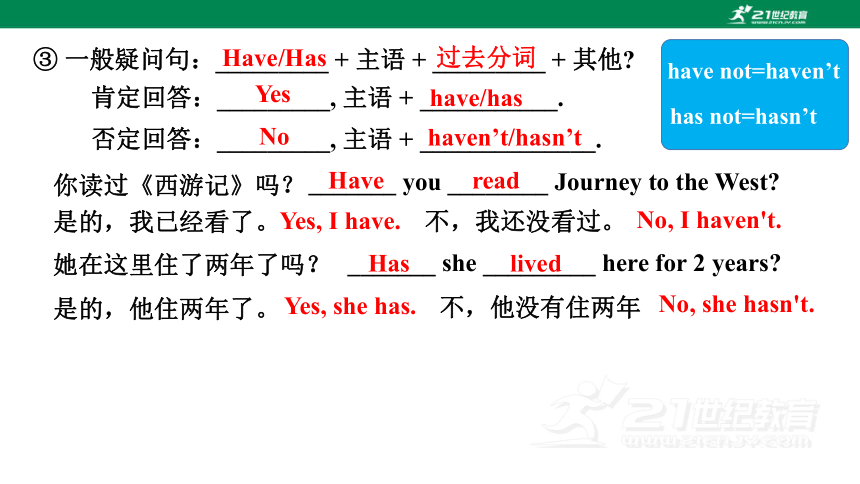
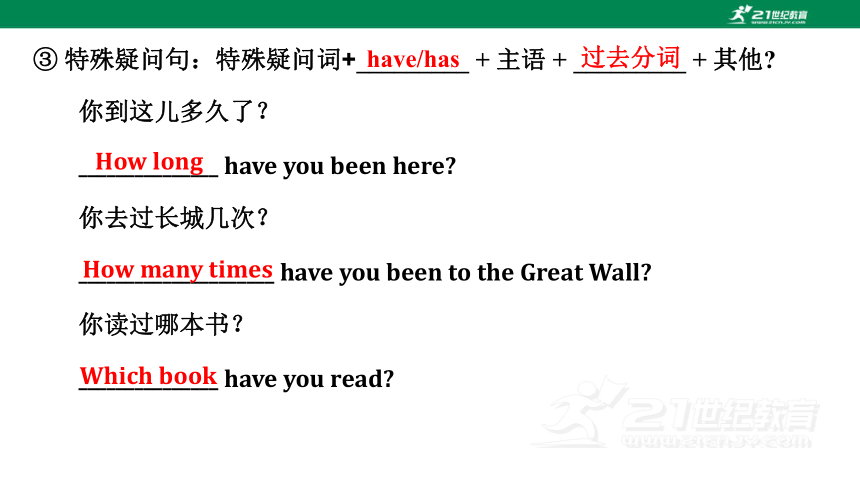
文档简介
(共51张PPT)
Unit 8 Have you read Treasure Island yet
重要知识点复习课件
人教版八年级下册
Point 1:
Oliver Twist is about a boy who goes out to sea and finds an island full of treasures. (教材 P58 2b)
full of是形容词短语,意为______________________________________,在句中作_________,也可在句中充当____________。
“满是…的;(有)大量的;(有)丰富的”
后置定语
状语或表语
他收到了几个装满苹果的篮子。
He received several baskets ____________.
鲁滨逊盯着那个脚印,满怀恐惧。
Robinson stared at the footprint, ___________.
她的眼里充满了泪水。
Her eyes were ___________.
full of apples
full of fear
full of tears
后置定语
状语
表语
full 形容词 意为_________。相当于busy。
形容词 意为______________,常用短语为_________,相当于_______________, 意为_____________。
形容词 意为_________, 其反义词是________, 意为_________。
fill fill用作及物动词,意为_____________________。fill…with…意为__________________。常见短语:be full of=be filled with __________。 【辨析】full与fill
“忙的”
“满的、充满的”
be full of
be filled with
“充满…”
“饱的”
“饥饿的”
hungry
“(使)充满;装满”
“用…填充/装满…”
充满…
他太忙了,以至于没有培养业余爱好的时间
He was too _________ to have time for hobbies.
在一年中的这个时候,旅馆经常客满。
Hotels are often ______ at this time of year.
房间里挤满了人
The room ________ people
The room ___________ people.
我不能再吃了,我相当饱了。
I can't eat any more. I am quite ______.
full/busy
full
is full of
is filled with
full
Point 2:
Oliver Twist is about a boy who goes out to sea and finds an island full of treasures. (教材 P58 2b)
treasure 作____________讲时,为不可数名词。作__________________讲时是_________,经常用______。
我们将把埋藏的财宝带到一个安全的地方。
We shall take the buried ________ away to a safe place.
这个美术馆有无价之宝。
The gallery has priceless art _________.
【拓展】treasure 的其他用法:动词,意为_____________。
我珍视他的友谊。
I _________ his friendship.
“珠宝;财富”
“贵重物品;珍品”
可数名词
复数
treasure
treasure
treasures
“珍惜;珍视”
现在完成时的用法:
过去
现在
将来
I had lunch.
I’m not hungry now
I have already had lunch.
1、表示_____发生或已经完成的某一动作对_____造成的影响或结果。
过去
现在
2、表示动作或状态从_____某一时间开始,一直_____到_____,而且可能还要继续下去。
过去
现在
将来
I lived here in 2018.
I still live here now.
I have lived here for three years.
过去
现在
持续
Point 3:
表示过去发生的动作或状态持续到现在,常伴有介词短语___________ 或 ______________,此外还有_________________________等等。
“for+时间段”
“since +时间点”
until now/up to now/so far
汤姆在这家公司上班三年了。
Tom has worked in this company _____________.
上个星期以来他一直很忙。
He has been busy ______________.
for three years
since last week
表示过去到现在的时间段内_____的动作,到现在已经_____。
重复
在过去的几个月,我已经读这本小说三次了。
I have read this novel three times in the past months.
这周到目前为止.我们已经参加三次考试了。
We have taken three tests so far this week.
完成
表示过去发生的动作对现在造成的_______。
我已经完成作业了。
I have already finished my homework.
有人把窗户打破了。
Someone has broken the window.
影响
① 肯定句:主语 + ___________ + __________ + 其他.
现在完成时的结构:
have/has
过去分词
主语 助动词 过去分词 其他成分
I(第一人称单数) have V.(动词)+ed 其他
he, she, it(第三人称单数) has you(第二人称单数/复数) have we, they(第一、三人称复数) have 我买了许多有关西方风俗的书。
I _____________ lots of books about Western customs.
他已经看过这部电影了。
He ______ already _______ the film.
have bought
has seen
② 否定句:主语 + ___________ + __________ + 其他.
have/has not
过去分词
主语 助动词 否定词not 过去分词 其他成分
I(第一人称单数) have have not(haven’t) V.(动词)+ed 其他
he, she, it(第三人称单数) has has not(hasn’t) you(第二人称单数/复数) have have not(haven’t) we, they(第一、三人称复数) have have not(haven’t) 埃里克还没有买到飞机票。
Eric ____________ his plane tickets yet.
从离开那天起,迈克一家就再也没去过加拿大。
The Mikes _______________ Canada since the day they left.
hasn't bought
haven't been to
③ 一般疑问句:_________ + 主语 + _________ + 其他
否定回答:_________, 主语 + ______________.
肯定回答:_________, 主语 + ___________.
Have/Has
Yes
have/has
haven’t/hasn’t
过去分词
No
have not=haven’t
has not=hasn’t
你读过《西游记》吗?
是的,我已经看了。
不,我还没看过。
_______ you ________ Journey to the West
Have read
Yes, I have.
No, I haven't.
她在这里住了两年了吗?
_______ she _________ here for 2 years
是的,他住两年了。
Yes, she has.
不,他没有住两年
No, she hasn't.
Has lived
③ 特殊疑问句:特殊疑问词+_________ + 主语 + _________ + 其他
have/has
过去分词
你到这儿多久了?
_______________ have you been here
你去过长城几次?
_____________________ have you been to the Great Wall
你读过哪本书?
_______________ have you read
How long
How many times
Which book
过去分词变化形式
(直 去 双 改 特)
过去分词与动词过去式变法规则基本一样。
变化规则 例词 一般情况下____________ work worked
jump jumped
look looked
以不发音字母e结尾的动词,___________ like liked
live lived
use used
以重读闭音节结尾且末尾只有一个辅音字母的动词,____________________________ stop stopped
plan planned
shop shopped
以辅音字母加“y”结尾的动词,要先____________,再加-ed,以元音字母加“y”结尾的动词,直接加-ed study studied
carry carried
play played
直接加-ed
去e加ed
双写该辅音字母后再加-ed
改“y”为“i”
过去分词不规则变化
(特)
现在式 过去式 过去分词 现在式 过去式 过去分词
be have
read [ri d] see
eat fight
fall feel
find fly
forget get
give go
hit hurt
know lead
was/were
been
had
had
read[red]
read[red]
saw
seen
ate
eaten
fought
fought
fell
fallen
felt
felt
found
found
flew
flown
forgot
forgotten
got
got
gave
given
gone
went
hit
hit
hurt
hurt
knew
known
led
led
现在式 过去式 过去分词 现在式 过去式 过去分词
leave hear
keep write
learn shoot
sit sing
sleep speak
spend stand
sweep swim
take teach
tell think
throw understand
wear win
left
left
heard
heard
kept
kept
learnt
learnt
shot
shot
sat
sat
sang
sung
slept
slept
spoke
spoken
spent
spent
stood
stood
swept
swept
swam
swum
took
taken
taught
taught
told
told
thought
thought
threw
thrown
understood
understood
wore
worn
won
won
wrote
written
3. ABA格式(动词原形与过去分词同形)
run→ran→run
come→came→come
become→became→become
4. ABC格式(动词原形、过去式、过去分词均不同形)
bear→bore→born
break→broke→broken
grow→grew→grown
5. AAB格式(动词原形与过去式同形)
beat→beat→beaten
1. AAA格式(动词原形、过去式、过去分词同形)
let→let→ let
put→put→put
read→read→read
2. ABB格式(过去式与过去分词同形)
feel→felt→felt
keep→kept→kept
sleep→slept→slept
不规则变化需要总结
现在完成时标志词
现在完成时不能和表示_______________连用,如:yesterday,last year,in 1980,three days ago,just now,when I came in等。现在完成时标志词有:already_______,ever_______,just_______,so far _______,yet__________,before_________,for+时间段___________,since+加时间点/一个过去式的句子____________________。
过去的时间状语
“已经”
“曾经”
“刚刚”
“至今”
“已经、还”
“…之久”
“自从…(到现在)”
“以前”
1、already_______,常用于________中,通常放在_______________,也可放________。
“已经”
肯定句
动词过去分词前
句末
我已经读过这本故事书了。
我已经洗了衣服。
I have ________ read this storybook.
I’ve washed my clothes _________.
already
already
表示吃惊等感彩时, already也可用于____________(口语)
疑问句
你(真的)已经见过他了
Have you met him _______
already
2、yet用在_______中意为______,用在______中意为______,放在______。
疑问句
“已经”
否定句
“还”
句尾
他已经找到他的手表了吗?
不,还没有。
Has he found his watch _____
No, not _____.
那位妇女还没有找到她的狗。
The woman hasn’t found her dog _____.
yet
yet
yet
3、just意为________,放在_________________。而just now__________,放在________,且代表___________________。
“刚刚”
动词过去分词之前
“刚刚”
句尾
“一般过去时”
他刚从学校回来。
He has _____ come back from school.
我刚刚完成我的家庭作业。
I finished my homework ________.
just
just now
4、so far意为________________________, 意义和用法相同的还有___________,___________放在___________。
“倒现在为止;迄今为止”
up to now
up till now
句首或句尾
到现在为止,我已乘火车旅行三次了。
I have travelled by train three times ________.
________, I have travelled by train three times.
so far
So far
5、ever意为_______,放在_________________。
“曾经”
动词的过去分词之前
你曾去过北京吗?
Have you _____ been to Beijing
我未曾和她说过话。
I haven't ______ spoken to her.
ever
ever
6、before意为_______,指过去不确定的某个时间,总是放在______,
“以前”
句末
你以前去过上海吗?
Have you been to Shanghai ________
我以前没吃过四川菜。
I haven’t eaten Sichuan food ________.
before
before
7、since意为______________,后面要跟______,或_________________,用于过去完成时。
“自从…(到现在)”
时间点
一个过去式的句子
8、for 意为_____________,后面要跟________,用于过去完成时。
“……之久”
时间段
________ 1984 ________ yesterday
________ about two days ________ two years
________ I was 10 for about two days ________ 10 years ago
________ threyears ago ________ over twenty years
________ she was a little girl ________ 10 years ago
He has been away ________ last week. ________ one week
since
for
since
since
since
since
since
since
since
for
for
for
口诀记忆: 句尾:since,for,yet
动前:ever,just
动前句尾:already
so far 前后,before后,
现在完成已看透。
________ 5 years ________ last Monday
________ you came here ________ a long time
________ 2018 ________ his 7th birthday
________ 2 days ________ 2 days ago
for
for
since
for
since
since
since
since
现在完成时与一般过去时的区别一
现在
过去
将来
比较:1. A: What did you do last weekend
B: I saw a new movie.
2. A: Would you like to see the movie with me
B: Thanks for your inviting, but I have seen it already.
总结 一般过去时 现在完成时
1.用法不同
(只谈论上周末做的事情,不涉及现在)
(影响:因为已经看过了,所以现在不去看了)
只表示过去的动作或状态
(不涉及现在)
表示过去发生的事情对现在造成的影响或结果
(与现在有联系)
现在完成时与一般过去时的区别二
比较:1. Tom ___________ (sweep) the floor yesterday.
2. My family ___________ (go) to Beijing last year.
3. I ___________ (can ) ride a bike when I was 6 years old.
4. I ________________ (not finish) my homework yet.
5. He ___________ (work) in the city for eight years.
6.判断正误: I have visited my grandparents yesterday.
He has finished his work two days ago.
(注:现在完成时的不能与表示过去的时间状语连用)
swept
went
could
haven’t finished
has worked
总结 一般过去时 现在完成时
2.时间状语不同
already, yet, just, ever, never, so far, for+时间段,since+时间点\从句...
yesterday, last week, ...ago, in 1995,in the past, just now, when...
Exercises
一、单项选择。
1.— It's ten years since we came here.
— How time flies! We _____ in China for so long.
A. work B. worked C. will work D. have worked
2.Today, all the erhu masters play and praise Erquan Yingyue. It _____ one of China's national treasures.
A.becomes B. became C. has become D. become
3.Miss Brown, we _____ cleaning our classroom. Can we go home now
A. finish B. finishing C. are finished D. have finished
D
C
D
4.— Your new watch is so nice! When did you buy it
— In April. I ______ it for two months.
A. have had B. had C. have bought D. bought
5.— Has your sister finished reading ________
— Yes. She has________ finished.
A. yet; yet B. yet; already
C. already; yet D. already; already
A
B
二、用括号中所给单词的适当形式填空。
1.She __________(not read) the book yet.
2.________ you ________(decide) which book to buy yet
3.Tom won't go to the cinema with us because he ________ already ________ (see) the film.
4.David hasn't ________(finish) ________(read) Harry Potter yet.
5.We ________ just ________(clean) the classroom.
6.I ________(lend) my bike to her yesterday, but she ____________ (not give) it back to me yet.
hasn't read
Have
has
seen
finished
have
cleaned
decided
reading
lent
hasn't given
三、按要求改写句子,每空一词。
1.She has already written the music. (改为一般疑问句)
________ she written the music _______
2.They studied English 2 years ago. (用 since two years ago 改写)
They ______ ________ English since two years ago.
3.Has Tom helped his parents yet (作出肯定回答)
_______, _____ _______.
Has
yet
have studied
Yes he has
4.The three students have been together for 3 hours. (对画线部分提问)
___________ ____________ have the three students been together
5.She has already gone to England. (改为否定句)
She _____________ gone to England _____________.
6.He hasn't come to school because he's ill. (对画线部分提问)
_____________ _____________ he come to school
How long
hasn't
Why hasn't
yet
Point 4:
A few weeks ago, I found the marks of another man's feet on the sand. (教材P59 3a)
mark 作名词,意为_____________;作名词,还可意为________;作动词,_______________。
“迹象;记号”
“分数”
“做记号;打分”
他的大脚在雪地里留下很多印记。
His big feet left ___________ in the snow.
合格分数是多少?
What’s the pass ______
他在手提箱上标上了自己的名字
He _______ his name on his suitcase
many marks
mark
marked
Point 4:
Who else is on my island (教材P59 3a)
else此处作形容词,意为_____________, 放在who,what等疑问词_____。
晚会上还有谁?
_________ was at the party
他还说了些什么?
___________ did he say
【拓展】else通常不放在疑问词which之后。else可用于以-one,-body,-thing,-place, -where等结尾的__________________之后。
请别人帮帮你吧。
Ask _____________ to help you.
他今天没有别的事要做。
He has ____________ to do today.
“别的;其他的”
之后
复合不定代词/副词
somebody else
nothing else
Who else
What else
【易混辨析】else 与 other
else 副词 修饰疑问代词、疑问副词或不定代词、不定副词,置于_____________。 在那些长途旅行中,我们没有别的事可做。We had ___________ to do on those long trips.
other 形容词 修饰名词,置于____________。 他不得不接受它;没有其他办法。
He had to accept it; there was no _________.
这些词之后
nothing else
名词之前
other way
Point 5:
One of them died but the other ran towards my house. (教材P59 3a)
towards 在美式英语中也常写作toward。表示_________,强调方向。有_______之意 我看见她朝银行走去。
I saw her walking ________ the bank.
to 一般位于come,go,move等动词后,___________。有“到达”之意 我们坐公共汽车上学。
We ___________ by bus.
【易混辨析】towards 与 to
动作朝向
“到达”
towards
go to school
强调目的地
One of them died but the other ran towards my house. (教材P59 3a)
one……the other……为固定定搭配,用于两者之间,意为______________________。
“一个……另一个……”
其中一个人死了,但是另一个人朝我的房子跑过来。
_________ of them died but _________ ran towards my house.
他有两个女儿。一个是医生,另一个是学生。
He has two daughters. ______ is a doctor, _________ is a student.
【拓展】some……the others……用于三者或三者以上,意为_____________________。
“一些……其余的……”
男孩儿们都在操场上。一些正在踢足球,其余的正在打网球。
Boys are on the playground. _________ are playing football and _________ are playing tennis.
One
the other
One
the other
Some
the others
Point 6:
辨析:other, another, others, the other与the others
other
another
others
the other
the others
其他的;另外的;别的(人或事物)
(三者或三者以上中的)另一个
另一些(并非全部),不表示特指
(两者中的)另一个
其余的;剩下的(全部),表示特指
1. You can chat with ______ people who are online.
2. She drinks ________ bottle of water.
3. There are no _______.
4. He lives on __________ side of the river.
5. This one is cheap, and _________ are expensive.
other
another
others
the other
the others
Exercises
Point 7:
The Toms must be popular. (教材P61 1b)
must be表示推测,意为_________________,常指有根据的推测,有把握的推测,一般用在__________。
“一定是;必定是”
肯定句中
一定是弄错了。
There __________ a mistake.
他肯定是病了。他的脸色那么苍白。
He __________ ill. He looks so pale.
must be
must be
【拓展】表示否定的推测“不可能”时,用_______,而不是 ________,mustn’t表示_________________。
can’t
mustn’t
“不可以;禁止”
他不可能是凶手,因为他整天都和家人在一起。
He ________ the murderer because he was with his family the whole day.
你不能在这里吸烟,否则你会被罚款的。
You _______ smoke here, or you will be fined.
can’t be
mustn’t
Point 8:
The Toms must be popular. (教材P61 1b)
此处the Toms是一个虚构的音乐团队的名称, 可能是由若干个名叫Tom的男子所组成(或起主要作用)的乐队。英语中________________________这一结构可用来表示__________,如表示某一姓氏的家庭,或同名的某几个人所组成的小群体。如:
“the +姓或名的复数形式”
某一群体
格林一家____________ 相当于___________________
杰克小组 ;杰克社团;杰克帮。___________
the Greens
the Green family
the Jacks
现在史密斯夫妇正在打网球。
___________ are playing tennis now.
现在格林一家 人正在吃晚饭。
___________ are having dinner now.
现在琼斯乐队正在演奏吉他。
___________ are playing the guitar now.
The Smiths
The Greens
The Jones
Point 9:
The Toms’ music sounds more like rock. (教材P61 1b)
sound是系动词,意思是___________, 后面接________________。
sound like意思是____________, 此短语中like是介词,后跟__________等。
“听起来...”
形容词词作表语
“听起来像”
名词或代词
那个故事听起来很有趣。
That story ________ quite interesting.
这听来是个好主意。
That ___________ a good idea.
【拓展】sound还可作名词使用,意为____________________等含义。
我们听到一种奇怪的声音。
We heard ________________.
声音比光传播得慢。
_______ travels slower than light.
a strange sound
Sound
sounds
sounds like
“声音,响声,音响”
Point 10:
Listening to The Toms is a good way to wake up. (教材P61 1b)
1、listening to the Toms是动名词短语,在句中做主语,指一件事时,谓语动词要用_________。
单数形式
帮助别人就是帮助自己
______________ is helping ourselves.
每天听音乐是一种好的放松方式。
_________________________ is a good way to relax ourselves.
2、a way to do sth.=a way of doing sth.意思是_____________________。
这是一个解决问题的好办法。
This is _____________________________.
解决这个问题的关键是多锻炼。
______________________________ is to exercise more.
Helping others
Listening to music every day
“做某件事的一种方法”
a good way to solve the problem
The key way to solve this problem
Point 11:
When Sarah was a teenager, she used to fight over almost everything with her family. (教材P62 2b)
fight over为固定短语,相当于fight about,意为___________________ fight的过去式和过去分词都为________。
两只狗正在为一块骨头撕咬。
The two dogs were ____________ a bone.
不要为琐事争吵。
Don’t __________ small things.
【拓展】fight against/with sb./sth. _____________________。
fight for sth. _________________________。
你又和你弟弟打架了吗?
他们为获得平等人权而斗争。
Have you ___________ your brother again
They ___________ equal human rights.
“因……争论/争……”
fought
fighting over
fight over
与……搏斗/打架/作战
为…而斗争,争取获得某物
fought with
fight for
Point 12:
But five years ago, while she was studying abroad in England, she heard a song full of feelings about returning home on the radio. (教材P62 2b)
abroad 副词,意为________________,与 abroad 相关的短语有:go abroad _____; at home and abroad _________。
“在国外;到国外”
出国
在国内外
她在国外工作了一年。
She worked _______ for a year
这位作家在国内外都很有名。
The writer is famous both _________________.
【拓展】aboard 为 abroad 的形近词,可作副词和介词,意为_______________________________。go aboard 意为_____________。
他母亲经常出国出差。她现在正登上飞往美国的飞机。
His mother often ___________ on business. She is _____________ the plane to America now.
abroad
at home and abroad
goes abroad
going aboard
“在(船或飞机等)上;上船;登机”
上船;登机”
on the radio为固定短语,意为________________________________。on在此处用作介词,表示__________________,其后常接一些表示媒介的词。
我给她打电话时,她正在通过收音机听一个有趣的节目。
She was listening to an interesting programme __________ when I called her.
类似的短语还有:
通过电话,在电话里 ___________________
通过电脑;在电脑上___________________
通过互联网,在网上___________________
通过电视,在电视上___________________
on the telephone
on the computer
on the Internet
on TV
on the radio
“通过收音机,以无线电的方式”
“借助,以某种方式”
Point 13:
She came to realize how much she actually missed all of them. (教材P62 2b)
come to do意为_________________________常与know, understand, realize, be, love, like等动词连用,强调_____________。
你是怎么认识格林先生的?
How did you ______________Mr Green
当你逐渐长大时,你会慢慢发现你的父母为你付出了多少
When you get older, you'll ______________ how much your parents have done for you.
【拓展】come to do还可意为__________________。
打扰了,你愿意来帮助我学数学吗
Excuse me, would you like to ____________ me with my maths
我们希望你会来看望我们。
We hope you'll ____________ us
come to know
“(事情)逐渐;终于……”
强调渐变过程
come to realize
“来做(从事)某事”
come to help
come to visit
Point 14:
Ever since then, she has been a fan of American country music. (教材P62 2b)
ever since 相当于 since,_______________。ever since 后可接短语或句子,也可单独使用。在含有 ever since 引导的时间状语从句的复合句中,主句常用____________,从句常用____________。
ever 起强调作用
现在完成时
一般过去时
自去年以来,我一直没有收到他的来信。
I haven’t heard from him ________ last year.
那天晚上,我的车撞到了一棵树上,从此一切都变了。
That night, my car crashed into a tree and everything has changed ________.
ever since
ever since
Point 15:
…, but not about belonging to a group. (教材P62 2b)
belong作不及物动词,不可用进行式。常与________连用,belong to.…… 意为___________。
介词to
“属于……”
那本字典是属于亚历克斯的。
That dictionary _________ Alex.
belongs to
【拓展】belong to后接__________________________,但后面不能接名词性物主代词或名词所有格。belong to常与物主代词或名词所有格进行句型转换。_______________________
名词或人称代词的宾格形式
belong to sb = be sb’s
它一定属于卡拉
It must ______________.
belong to Carla
It must _________.
(改同义句)
be Carla’s
Point 16:
However, country music brings us back to the “good old days” when people were kind to each other and trusted one another. (教材P62 2b)
each other 与 one another 均为相互代词,意为______________,二者常可互换。它们可放在及物动词之后可直接用作宾语(如help each other);而在不及物动词之后,则要___________(talk to each other/learn from one another)。
“相互;彼此”
借助介词
我们都互相帮助。
We all __________________________.
他们彼此看了看便笑了起来
They looked _______________________ and laughed.
help each other/one another
at each other/one another
【拓展】都有名词所有格each other’s/ one another’s________________。
他们彼此都了解对方的优点。
They know ________________________ advantages.
“彼此的;对方的”
each other's/ one another's
Point 17:
He's sold more than 120 million records. (教材P62 2b)
million 作数词,前面有具体数字时,million ___________,____________。millions of 意为_________________,millions 前不能加具体数字,of 后面跟_______________。
这个城市大约有200万人。
There are about _______________ in the city.
数百万儿童没有足够的食物吃。
__________________ don’t have enough food to eat.
two million people
Millions of children
“数百万的”
可数名词复数
后不能加 –s
也不能跟 of
【拓展】hundred(一百),thousand(一千),billion(十亿)的用法与 million 相似。
hundreds of ____________ thousands of _____________
billions of _____________
成百上千的
成千上万的
数十亿的
口诀:模糊数字两有(有-s,有of);具体数字两无(无-s,无of)。
He's sold more than 120 million records. (教材P62 2b)
Point 18:
record 作名词时读[ rek d]或[r k d],作________时读[r k d],意为________________,作______时读[ rek d],意为________________,record的词性和词义要根据上下文理解。
动词
“录制;录(音)”
名词
“唱片;记录”
我花了很多时间听唱片。
I spent a lot of time __________________.
I try to keep a ________ of every cent I spend.
我尽量记录下我花的每一分钱。
I’ll ______________ and we can watch it later.
我会把这部电影录下来,我们可以稍后再看。
The athlete broke the ______________ in his last match.
这位运动员在最后一场比赛中打破了世界纪录。
listening to records
record
record the film
world record
Point 19:
The number of the records he has sold (教材P63 2b)
【易混辨析】the number of 与 a number of:
the number of 意为____________,后接__________作主语时,中心词是number,谓语动词要用_________。
a number of 意为____________,相当于__________,修饰可数名词复数。后接复数名词作主语时,谓语动词要用_______。number前可用large,small等词修饰,以__________。
“……的数量”
复数名词
单数
“一些;许多”
a lot of
复数
表示程度
现在去泰国参观的人数已经增加了。
______________visitors to Thailand ____ now increased.
这所学校的学生数目大约是3000。
______________ students in this school ____ about 3,000.
图书馆里有许多书。
There ____ ____________ books in the library.
The number of
has
The number of
is
a number of
are
谢谢
21世纪教育网(www.21cnjy.com)
中小学教育资源网站
兼职招聘:
https://www.21cnjy.com/recruitment/home/admin
Unit 8 Have you read Treasure Island yet
重要知识点复习课件
人教版八年级下册
Point 1:
Oliver Twist is about a boy who goes out to sea and finds an island full of treasures. (教材 P58 2b)
full of是形容词短语,意为______________________________________,在句中作_________,也可在句中充当____________。
“满是…的;(有)大量的;(有)丰富的”
后置定语
状语或表语
他收到了几个装满苹果的篮子。
He received several baskets ____________.
鲁滨逊盯着那个脚印,满怀恐惧。
Robinson stared at the footprint, ___________.
她的眼里充满了泪水。
Her eyes were ___________.
full of apples
full of fear
full of tears
后置定语
状语
表语
full 形容词 意为_________。相当于busy。
形容词 意为______________,常用短语为_________,相当于_______________, 意为_____________。
形容词 意为_________, 其反义词是________, 意为_________。
fill fill用作及物动词,意为_____________________。fill…with…意为__________________。常见短语:be full of=be filled with __________。 【辨析】full与fill
“忙的”
“满的、充满的”
be full of
be filled with
“充满…”
“饱的”
“饥饿的”
hungry
“(使)充满;装满”
“用…填充/装满…”
充满…
他太忙了,以至于没有培养业余爱好的时间
He was too _________ to have time for hobbies.
在一年中的这个时候,旅馆经常客满。
Hotels are often ______ at this time of year.
房间里挤满了人
The room ________ people
The room ___________ people.
我不能再吃了,我相当饱了。
I can't eat any more. I am quite ______.
full/busy
full
is full of
is filled with
full
Point 2:
Oliver Twist is about a boy who goes out to sea and finds an island full of treasures. (教材 P58 2b)
treasure 作____________讲时,为不可数名词。作__________________讲时是_________,经常用______。
我们将把埋藏的财宝带到一个安全的地方。
We shall take the buried ________ away to a safe place.
这个美术馆有无价之宝。
The gallery has priceless art _________.
【拓展】treasure 的其他用法:动词,意为_____________。
我珍视他的友谊。
I _________ his friendship.
“珠宝;财富”
“贵重物品;珍品”
可数名词
复数
treasure
treasure
treasures
“珍惜;珍视”
现在完成时的用法:
过去
现在
将来
I had lunch.
I’m not hungry now
I have already had lunch.
1、表示_____发生或已经完成的某一动作对_____造成的影响或结果。
过去
现在
2、表示动作或状态从_____某一时间开始,一直_____到_____,而且可能还要继续下去。
过去
现在
将来
I lived here in 2018.
I still live here now.
I have lived here for three years.
过去
现在
持续
Point 3:
表示过去发生的动作或状态持续到现在,常伴有介词短语___________ 或 ______________,此外还有_________________________等等。
“for+时间段”
“since +时间点”
until now/up to now/so far
汤姆在这家公司上班三年了。
Tom has worked in this company _____________.
上个星期以来他一直很忙。
He has been busy ______________.
for three years
since last week
表示过去到现在的时间段内_____的动作,到现在已经_____。
重复
在过去的几个月,我已经读这本小说三次了。
I have read this novel three times in the past months.
这周到目前为止.我们已经参加三次考试了。
We have taken three tests so far this week.
完成
表示过去发生的动作对现在造成的_______。
我已经完成作业了。
I have already finished my homework.
有人把窗户打破了。
Someone has broken the window.
影响
① 肯定句:主语 + ___________ + __________ + 其他.
现在完成时的结构:
have/has
过去分词
主语 助动词 过去分词 其他成分
I(第一人称单数) have V.(动词)+ed 其他
he, she, it(第三人称单数) has you(第二人称单数/复数) have we, they(第一、三人称复数) have 我买了许多有关西方风俗的书。
I _____________ lots of books about Western customs.
他已经看过这部电影了。
He ______ already _______ the film.
have bought
has seen
② 否定句:主语 + ___________ + __________ + 其他.
have/has not
过去分词
主语 助动词 否定词not 过去分词 其他成分
I(第一人称单数) have have not(haven’t) V.(动词)+ed 其他
he, she, it(第三人称单数) has has not(hasn’t) you(第二人称单数/复数) have have not(haven’t) we, they(第一、三人称复数) have have not(haven’t) 埃里克还没有买到飞机票。
Eric ____________ his plane tickets yet.
从离开那天起,迈克一家就再也没去过加拿大。
The Mikes _______________ Canada since the day they left.
hasn't bought
haven't been to
③ 一般疑问句:_________ + 主语 + _________ + 其他
否定回答:_________, 主语 + ______________.
肯定回答:_________, 主语 + ___________.
Have/Has
Yes
have/has
haven’t/hasn’t
过去分词
No
have not=haven’t
has not=hasn’t
你读过《西游记》吗?
是的,我已经看了。
不,我还没看过。
_______ you ________ Journey to the West
Have read
Yes, I have.
No, I haven't.
她在这里住了两年了吗?
_______ she _________ here for 2 years
是的,他住两年了。
Yes, she has.
不,他没有住两年
No, she hasn't.
Has lived
③ 特殊疑问句:特殊疑问词+_________ + 主语 + _________ + 其他
have/has
过去分词
你到这儿多久了?
_______________ have you been here
你去过长城几次?
_____________________ have you been to the Great Wall
你读过哪本书?
_______________ have you read
How long
How many times
Which book
过去分词变化形式
(直 去 双 改 特)
过去分词与动词过去式变法规则基本一样。
变化规则 例词 一般情况下____________ work worked
jump jumped
look looked
以不发音字母e结尾的动词,___________ like liked
live lived
use used
以重读闭音节结尾且末尾只有一个辅音字母的动词,____________________________ stop stopped
plan planned
shop shopped
以辅音字母加“y”结尾的动词,要先____________,再加-ed,以元音字母加“y”结尾的动词,直接加-ed study studied
carry carried
play played
直接加-ed
去e加ed
双写该辅音字母后再加-ed
改“y”为“i”
过去分词不规则变化
(特)
现在式 过去式 过去分词 现在式 过去式 过去分词
be have
read [ri d] see
eat fight
fall feel
find fly
forget get
give go
hit hurt
know lead
was/were
been
had
had
read[red]
read[red]
saw
seen
ate
eaten
fought
fought
fell
fallen
felt
felt
found
found
flew
flown
forgot
forgotten
got
got
gave
given
gone
went
hit
hit
hurt
hurt
knew
known
led
led
现在式 过去式 过去分词 现在式 过去式 过去分词
leave hear
keep write
learn shoot
sit sing
sleep speak
spend stand
sweep swim
take teach
tell think
throw understand
wear win
left
left
heard
heard
kept
kept
learnt
learnt
shot
shot
sat
sat
sang
sung
slept
slept
spoke
spoken
spent
spent
stood
stood
swept
swept
swam
swum
took
taken
taught
taught
told
told
thought
thought
threw
thrown
understood
understood
wore
worn
won
won
wrote
written
3. ABA格式(动词原形与过去分词同形)
run→ran→run
come→came→come
become→became→become
4. ABC格式(动词原形、过去式、过去分词均不同形)
bear→bore→born
break→broke→broken
grow→grew→grown
5. AAB格式(动词原形与过去式同形)
beat→beat→beaten
1. AAA格式(动词原形、过去式、过去分词同形)
let→let→ let
put→put→put
read→read→read
2. ABB格式(过去式与过去分词同形)
feel→felt→felt
keep→kept→kept
sleep→slept→slept
不规则变化需要总结
现在完成时标志词
现在完成时不能和表示_______________连用,如:yesterday,last year,in 1980,three days ago,just now,when I came in等。现在完成时标志词有:already_______,ever_______,just_______,so far _______,yet__________,before_________,for+时间段___________,since+加时间点/一个过去式的句子____________________。
过去的时间状语
“已经”
“曾经”
“刚刚”
“至今”
“已经、还”
“…之久”
“自从…(到现在)”
“以前”
1、already_______,常用于________中,通常放在_______________,也可放________。
“已经”
肯定句
动词过去分词前
句末
我已经读过这本故事书了。
我已经洗了衣服。
I have ________ read this storybook.
I’ve washed my clothes _________.
already
already
表示吃惊等感彩时, already也可用于____________(口语)
疑问句
你(真的)已经见过他了
Have you met him _______
already
2、yet用在_______中意为______,用在______中意为______,放在______。
疑问句
“已经”
否定句
“还”
句尾
他已经找到他的手表了吗?
不,还没有。
Has he found his watch _____
No, not _____.
那位妇女还没有找到她的狗。
The woman hasn’t found her dog _____.
yet
yet
yet
3、just意为________,放在_________________。而just now__________,放在________,且代表___________________。
“刚刚”
动词过去分词之前
“刚刚”
句尾
“一般过去时”
他刚从学校回来。
He has _____ come back from school.
我刚刚完成我的家庭作业。
I finished my homework ________.
just
just now
4、so far意为________________________, 意义和用法相同的还有___________,___________放在___________。
“倒现在为止;迄今为止”
up to now
up till now
句首或句尾
到现在为止,我已乘火车旅行三次了。
I have travelled by train three times ________.
________, I have travelled by train three times.
so far
So far
5、ever意为_______,放在_________________。
“曾经”
动词的过去分词之前
你曾去过北京吗?
Have you _____ been to Beijing
我未曾和她说过话。
I haven't ______ spoken to her.
ever
ever
6、before意为_______,指过去不确定的某个时间,总是放在______,
“以前”
句末
你以前去过上海吗?
Have you been to Shanghai ________
我以前没吃过四川菜。
I haven’t eaten Sichuan food ________.
before
before
7、since意为______________,后面要跟______,或_________________,用于过去完成时。
“自从…(到现在)”
时间点
一个过去式的句子
8、for 意为_____________,后面要跟________,用于过去完成时。
“……之久”
时间段
________ 1984 ________ yesterday
________ about two days ________ two years
________ I was 10 for about two days ________ 10 years ago
________ threyears ago ________ over twenty years
________ she was a little girl ________ 10 years ago
He has been away ________ last week. ________ one week
since
for
since
since
since
since
since
since
since
for
for
for
口诀记忆: 句尾:since,for,yet
动前:ever,just
动前句尾:already
so far 前后,before后,
现在完成已看透。
________ 5 years ________ last Monday
________ you came here ________ a long time
________ 2018 ________ his 7th birthday
________ 2 days ________ 2 days ago
for
for
since
for
since
since
since
since
现在完成时与一般过去时的区别一
现在
过去
将来
比较:1. A: What did you do last weekend
B: I saw a new movie.
2. A: Would you like to see the movie with me
B: Thanks for your inviting, but I have seen it already.
总结 一般过去时 现在完成时
1.用法不同
(只谈论上周末做的事情,不涉及现在)
(影响:因为已经看过了,所以现在不去看了)
只表示过去的动作或状态
(不涉及现在)
表示过去发生的事情对现在造成的影响或结果
(与现在有联系)
现在完成时与一般过去时的区别二
比较:1. Tom ___________ (sweep) the floor yesterday.
2. My family ___________ (go) to Beijing last year.
3. I ___________ (can ) ride a bike when I was 6 years old.
4. I ________________ (not finish) my homework yet.
5. He ___________ (work) in the city for eight years.
6.判断正误: I have visited my grandparents yesterday.
He has finished his work two days ago.
(注:现在完成时的不能与表示过去的时间状语连用)
swept
went
could
haven’t finished
has worked
总结 一般过去时 现在完成时
2.时间状语不同
already, yet, just, ever, never, so far, for+时间段,since+时间点\从句...
yesterday, last week, ...ago, in 1995,in the past, just now, when...
Exercises
一、单项选择。
1.— It's ten years since we came here.
— How time flies! We _____ in China for so long.
A. work B. worked C. will work D. have worked
2.Today, all the erhu masters play and praise Erquan Yingyue. It _____ one of China's national treasures.
A.becomes B. became C. has become D. become
3.Miss Brown, we _____ cleaning our classroom. Can we go home now
A. finish B. finishing C. are finished D. have finished
D
C
D
4.— Your new watch is so nice! When did you buy it
— In April. I ______ it for two months.
A. have had B. had C. have bought D. bought
5.— Has your sister finished reading ________
— Yes. She has________ finished.
A. yet; yet B. yet; already
C. already; yet D. already; already
A
B
二、用括号中所给单词的适当形式填空。
1.She __________(not read) the book yet.
2.________ you ________(decide) which book to buy yet
3.Tom won't go to the cinema with us because he ________ already ________ (see) the film.
4.David hasn't ________(finish) ________(read) Harry Potter yet.
5.We ________ just ________(clean) the classroom.
6.I ________(lend) my bike to her yesterday, but she ____________ (not give) it back to me yet.
hasn't read
Have
has
seen
finished
have
cleaned
decided
reading
lent
hasn't given
三、按要求改写句子,每空一词。
1.She has already written the music. (改为一般疑问句)
________ she written the music _______
2.They studied English 2 years ago. (用 since two years ago 改写)
They ______ ________ English since two years ago.
3.Has Tom helped his parents yet (作出肯定回答)
_______, _____ _______.
Has
yet
have studied
Yes he has
4.The three students have been together for 3 hours. (对画线部分提问)
___________ ____________ have the three students been together
5.She has already gone to England. (改为否定句)
She _____________ gone to England _____________.
6.He hasn't come to school because he's ill. (对画线部分提问)
_____________ _____________ he come to school
How long
hasn't
Why hasn't
yet
Point 4:
A few weeks ago, I found the marks of another man's feet on the sand. (教材P59 3a)
mark 作名词,意为_____________;作名词,还可意为________;作动词,_______________。
“迹象;记号”
“分数”
“做记号;打分”
他的大脚在雪地里留下很多印记。
His big feet left ___________ in the snow.
合格分数是多少?
What’s the pass ______
他在手提箱上标上了自己的名字
He _______ his name on his suitcase
many marks
mark
marked
Point 4:
Who else is on my island (教材P59 3a)
else此处作形容词,意为_____________, 放在who,what等疑问词_____。
晚会上还有谁?
_________ was at the party
他还说了些什么?
___________ did he say
【拓展】else通常不放在疑问词which之后。else可用于以-one,-body,-thing,-place, -where等结尾的__________________之后。
请别人帮帮你吧。
Ask _____________ to help you.
他今天没有别的事要做。
He has ____________ to do today.
“别的;其他的”
之后
复合不定代词/副词
somebody else
nothing else
Who else
What else
【易混辨析】else 与 other
else 副词 修饰疑问代词、疑问副词或不定代词、不定副词,置于_____________。 在那些长途旅行中,我们没有别的事可做。We had ___________ to do on those long trips.
other 形容词 修饰名词,置于____________。 他不得不接受它;没有其他办法。
He had to accept it; there was no _________.
这些词之后
nothing else
名词之前
other way
Point 5:
One of them died but the other ran towards my house. (教材P59 3a)
towards 在美式英语中也常写作toward。表示_________,强调方向。有_______之意 我看见她朝银行走去。
I saw her walking ________ the bank.
to 一般位于come,go,move等动词后,___________。有“到达”之意 我们坐公共汽车上学。
We ___________ by bus.
【易混辨析】towards 与 to
动作朝向
“到达”
towards
go to school
强调目的地
One of them died but the other ran towards my house. (教材P59 3a)
one……the other……为固定定搭配,用于两者之间,意为______________________。
“一个……另一个……”
其中一个人死了,但是另一个人朝我的房子跑过来。
_________ of them died but _________ ran towards my house.
他有两个女儿。一个是医生,另一个是学生。
He has two daughters. ______ is a doctor, _________ is a student.
【拓展】some……the others……用于三者或三者以上,意为_____________________。
“一些……其余的……”
男孩儿们都在操场上。一些正在踢足球,其余的正在打网球。
Boys are on the playground. _________ are playing football and _________ are playing tennis.
One
the other
One
the other
Some
the others
Point 6:
辨析:other, another, others, the other与the others
other
another
others
the other
the others
其他的;另外的;别的(人或事物)
(三者或三者以上中的)另一个
另一些(并非全部),不表示特指
(两者中的)另一个
其余的;剩下的(全部),表示特指
1. You can chat with ______ people who are online.
2. She drinks ________ bottle of water.
3. There are no _______.
4. He lives on __________ side of the river.
5. This one is cheap, and _________ are expensive.
other
another
others
the other
the others
Exercises
Point 7:
The Toms must be popular. (教材P61 1b)
must be表示推测,意为_________________,常指有根据的推测,有把握的推测,一般用在__________。
“一定是;必定是”
肯定句中
一定是弄错了。
There __________ a mistake.
他肯定是病了。他的脸色那么苍白。
He __________ ill. He looks so pale.
must be
must be
【拓展】表示否定的推测“不可能”时,用_______,而不是 ________,mustn’t表示_________________。
can’t
mustn’t
“不可以;禁止”
他不可能是凶手,因为他整天都和家人在一起。
He ________ the murderer because he was with his family the whole day.
你不能在这里吸烟,否则你会被罚款的。
You _______ smoke here, or you will be fined.
can’t be
mustn’t
Point 8:
The Toms must be popular. (教材P61 1b)
此处the Toms是一个虚构的音乐团队的名称, 可能是由若干个名叫Tom的男子所组成(或起主要作用)的乐队。英语中________________________这一结构可用来表示__________,如表示某一姓氏的家庭,或同名的某几个人所组成的小群体。如:
“the +姓或名的复数形式”
某一群体
格林一家____________ 相当于___________________
杰克小组 ;杰克社团;杰克帮。___________
the Greens
the Green family
the Jacks
现在史密斯夫妇正在打网球。
___________ are playing tennis now.
现在格林一家 人正在吃晚饭。
___________ are having dinner now.
现在琼斯乐队正在演奏吉他。
___________ are playing the guitar now.
The Smiths
The Greens
The Jones
Point 9:
The Toms’ music sounds more like rock. (教材P61 1b)
sound是系动词,意思是___________, 后面接________________。
sound like意思是____________, 此短语中like是介词,后跟__________等。
“听起来...”
形容词词作表语
“听起来像”
名词或代词
那个故事听起来很有趣。
That story ________ quite interesting.
这听来是个好主意。
That ___________ a good idea.
【拓展】sound还可作名词使用,意为____________________等含义。
我们听到一种奇怪的声音。
We heard ________________.
声音比光传播得慢。
_______ travels slower than light.
a strange sound
Sound
sounds
sounds like
“声音,响声,音响”
Point 10:
Listening to The Toms is a good way to wake up. (教材P61 1b)
1、listening to the Toms是动名词短语,在句中做主语,指一件事时,谓语动词要用_________。
单数形式
帮助别人就是帮助自己
______________ is helping ourselves.
每天听音乐是一种好的放松方式。
_________________________ is a good way to relax ourselves.
2、a way to do sth.=a way of doing sth.意思是_____________________。
这是一个解决问题的好办法。
This is _____________________________.
解决这个问题的关键是多锻炼。
______________________________ is to exercise more.
Helping others
Listening to music every day
“做某件事的一种方法”
a good way to solve the problem
The key way to solve this problem
Point 11:
When Sarah was a teenager, she used to fight over almost everything with her family. (教材P62 2b)
fight over为固定短语,相当于fight about,意为___________________ fight的过去式和过去分词都为________。
两只狗正在为一块骨头撕咬。
The two dogs were ____________ a bone.
不要为琐事争吵。
Don’t __________ small things.
【拓展】fight against/with sb./sth. _____________________。
fight for sth. _________________________。
你又和你弟弟打架了吗?
他们为获得平等人权而斗争。
Have you ___________ your brother again
They ___________ equal human rights.
“因……争论/争……”
fought
fighting over
fight over
与……搏斗/打架/作战
为…而斗争,争取获得某物
fought with
fight for
Point 12:
But five years ago, while she was studying abroad in England, she heard a song full of feelings about returning home on the radio. (教材P62 2b)
abroad 副词,意为________________,与 abroad 相关的短语有:go abroad _____; at home and abroad _________。
“在国外;到国外”
出国
在国内外
她在国外工作了一年。
She worked _______ for a year
这位作家在国内外都很有名。
The writer is famous both _________________.
【拓展】aboard 为 abroad 的形近词,可作副词和介词,意为_______________________________。go aboard 意为_____________。
他母亲经常出国出差。她现在正登上飞往美国的飞机。
His mother often ___________ on business. She is _____________ the plane to America now.
abroad
at home and abroad
goes abroad
going aboard
“在(船或飞机等)上;上船;登机”
上船;登机”
on the radio为固定短语,意为________________________________。on在此处用作介词,表示__________________,其后常接一些表示媒介的词。
我给她打电话时,她正在通过收音机听一个有趣的节目。
She was listening to an interesting programme __________ when I called her.
类似的短语还有:
通过电话,在电话里 ___________________
通过电脑;在电脑上___________________
通过互联网,在网上___________________
通过电视,在电视上___________________
on the telephone
on the computer
on the Internet
on TV
on the radio
“通过收音机,以无线电的方式”
“借助,以某种方式”
Point 13:
She came to realize how much she actually missed all of them. (教材P62 2b)
come to do意为_________________________常与know, understand, realize, be, love, like等动词连用,强调_____________。
你是怎么认识格林先生的?
How did you ______________Mr Green
当你逐渐长大时,你会慢慢发现你的父母为你付出了多少
When you get older, you'll ______________ how much your parents have done for you.
【拓展】come to do还可意为__________________。
打扰了,你愿意来帮助我学数学吗
Excuse me, would you like to ____________ me with my maths
我们希望你会来看望我们。
We hope you'll ____________ us
come to know
“(事情)逐渐;终于……”
强调渐变过程
come to realize
“来做(从事)某事”
come to help
come to visit
Point 14:
Ever since then, she has been a fan of American country music. (教材P62 2b)
ever since 相当于 since,_______________。ever since 后可接短语或句子,也可单独使用。在含有 ever since 引导的时间状语从句的复合句中,主句常用____________,从句常用____________。
ever 起强调作用
现在完成时
一般过去时
自去年以来,我一直没有收到他的来信。
I haven’t heard from him ________ last year.
那天晚上,我的车撞到了一棵树上,从此一切都变了。
That night, my car crashed into a tree and everything has changed ________.
ever since
ever since
Point 15:
…, but not about belonging to a group. (教材P62 2b)
belong作不及物动词,不可用进行式。常与________连用,belong to.…… 意为___________。
介词to
“属于……”
那本字典是属于亚历克斯的。
That dictionary _________ Alex.
belongs to
【拓展】belong to后接__________________________,但后面不能接名词性物主代词或名词所有格。belong to常与物主代词或名词所有格进行句型转换。_______________________
名词或人称代词的宾格形式
belong to sb = be sb’s
它一定属于卡拉
It must ______________.
belong to Carla
It must _________.
(改同义句)
be Carla’s
Point 16:
However, country music brings us back to the “good old days” when people were kind to each other and trusted one another. (教材P62 2b)
each other 与 one another 均为相互代词,意为______________,二者常可互换。它们可放在及物动词之后可直接用作宾语(如help each other);而在不及物动词之后,则要___________(talk to each other/learn from one another)。
“相互;彼此”
借助介词
我们都互相帮助。
We all __________________________.
他们彼此看了看便笑了起来
They looked _______________________ and laughed.
help each other/one another
at each other/one another
【拓展】都有名词所有格each other’s/ one another’s________________。
他们彼此都了解对方的优点。
They know ________________________ advantages.
“彼此的;对方的”
each other's/ one another's
Point 17:
He's sold more than 120 million records. (教材P62 2b)
million 作数词,前面有具体数字时,million ___________,____________。millions of 意为_________________,millions 前不能加具体数字,of 后面跟_______________。
这个城市大约有200万人。
There are about _______________ in the city.
数百万儿童没有足够的食物吃。
__________________ don’t have enough food to eat.
two million people
Millions of children
“数百万的”
可数名词复数
后不能加 –s
也不能跟 of
【拓展】hundred(一百),thousand(一千),billion(十亿)的用法与 million 相似。
hundreds of ____________ thousands of _____________
billions of _____________
成百上千的
成千上万的
数十亿的
口诀:模糊数字两有(有-s,有of);具体数字两无(无-s,无of)。
He's sold more than 120 million records. (教材P62 2b)
Point 18:
record 作名词时读[ rek d]或[r k d],作________时读[r k d],意为________________,作______时读[ rek d],意为________________,record的词性和词义要根据上下文理解。
动词
“录制;录(音)”
名词
“唱片;记录”
我花了很多时间听唱片。
I spent a lot of time __________________.
I try to keep a ________ of every cent I spend.
我尽量记录下我花的每一分钱。
I’ll ______________ and we can watch it later.
我会把这部电影录下来,我们可以稍后再看。
The athlete broke the ______________ in his last match.
这位运动员在最后一场比赛中打破了世界纪录。
listening to records
record
record the film
world record
Point 19:
The number of the records he has sold (教材P63 2b)
【易混辨析】the number of 与 a number of:
the number of 意为____________,后接__________作主语时,中心词是number,谓语动词要用_________。
a number of 意为____________,相当于__________,修饰可数名词复数。后接复数名词作主语时,谓语动词要用_______。number前可用large,small等词修饰,以__________。
“……的数量”
复数名词
单数
“一些;许多”
a lot of
复数
表示程度
现在去泰国参观的人数已经增加了。
______________visitors to Thailand ____ now increased.
这所学校的学生数目大约是3000。
______________ students in this school ____ about 3,000.
图书馆里有许多书。
There ____ ____________ books in the library.
The number of
has
The number of
is
a number of
are
谢谢
21世纪教育网(www.21cnjy.com)
中小学教育资源网站
兼职招聘:
https://www.21cnjy.com/recruitment/home/admin
同课章节目录
- Unit 1 What's the matter?
- Section A
- Section B
- Unit 2 I'll help to clean up the city parks.
- Section A
- Section B
- Unit 3 Could you please clean your room?
- Section A
- Section B
- Unit 4 Why don't you talk to your parents?
- Section A
- Section B
- Unit 5 What were you doing when the rainstorm came
- Section A
- Section B
- Review of Units 1-5
- Unit 6 An old man tried to move the mountains.
- Section A
- Section B
- Unit 7 What's the highest mountain in the world?
- Section A
- Section B
- Unit 8 Have you read Treasure Island yet?
- Section A
- Section B
- Unit 9 Have you ever been to a museum?
- Section A
- Section B
- Unit 10 I've had this bike for three years.
- Section A
- Section B
